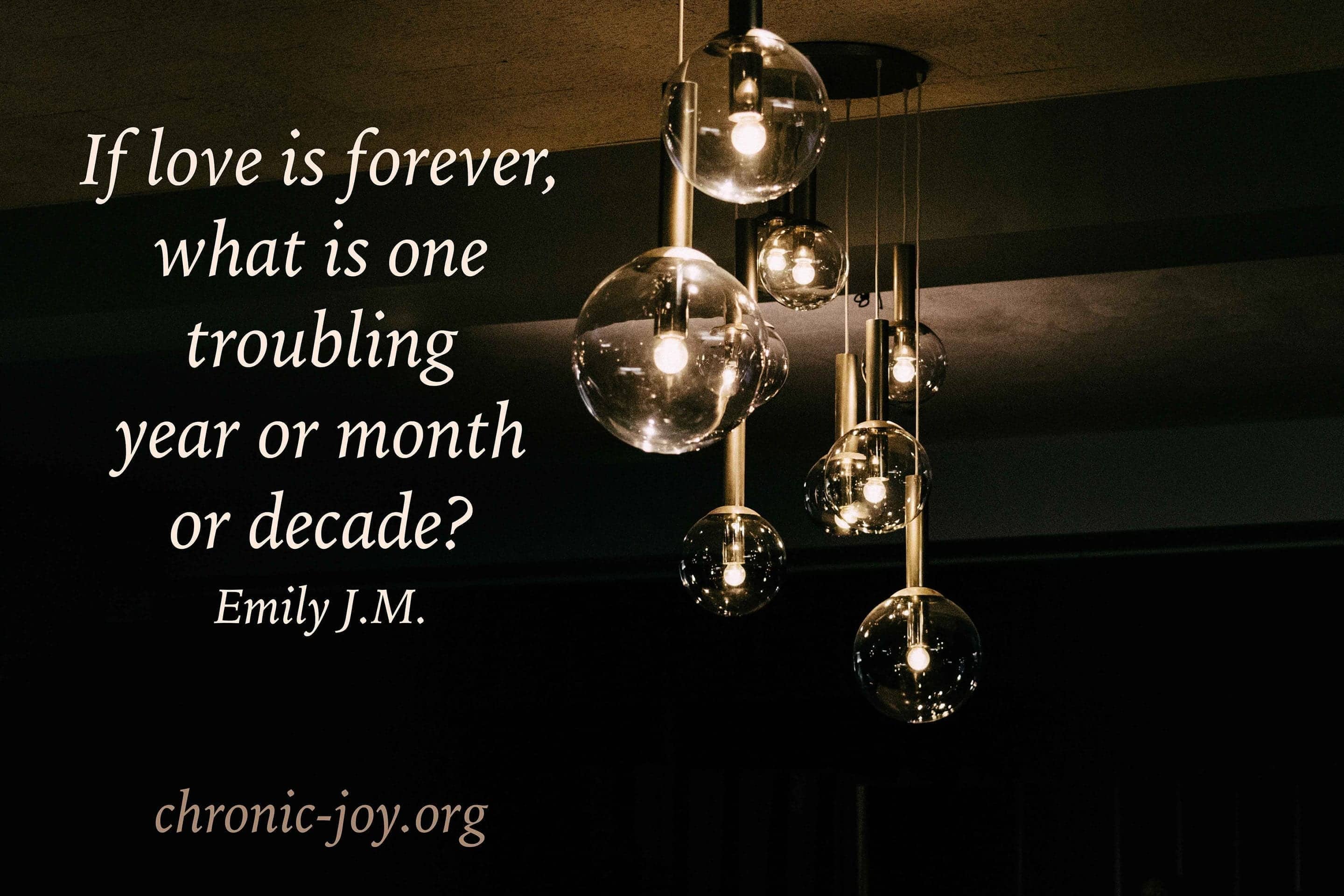
If love is forever, what’s one troubling day, month, or decade? ~ Emily J.M.
RELATIONSHIPS AND CHRONIC ILLNESS
My chronically-ill spouse, friend, or family member hates me – and I suspect I’m beginning to hate them back.
These are BIG words.
Painful, awful words.
Being hurt by someone you love is also painful and awful. Dislike just doesn’t do it justice.
When we’ve invested a lot of time and emotional energy into a difficult relationship, it can be devastating when it crumbles. This is especially true when our partner or friend is battling a chronic illness.
If our ill family member yells at us or threatens to leave, it can also be shameful. Fighting with your hospitalized grandmother or complaining about your chronically-ill brother just seems wrong — but it happens.
So what do you do?
RELATIONSHIPS AND CHRONIC ILLNESS: 3 QUESTIONS TO ASK:
- What is it that is making us believe our relationship is under threat?
- Is it something concrete?
- Is it something more subtle?
Here are a few common reasons we feel under threat:
- We feel taken for granted. It hurts because our loved one doesn’t seem to realize all we’ve sacrificed and all we are doing. They don’t express their gratitude enough or in the right ways.
- They are actively hurting us with their words. Our chronically-ill partner puts us down or is overly critical. They attack our way of doing things and constantly compare us to others.
- They refuse to do small things to make our lives easier. They seem wrapped up in their pain and never ask how we are.
What specific things do you find difficult in your relationship? Can we blame the chronic illness?
This question is important. Not because we ought to use their illness as an excuse to write off their actions or pardon atrocities, but because we need to take sickness into account.
Why? — because illness changes people. If we are in pain, our tempers are shorter, and it’s harder to remain positive. I think we owe it to our ill family members to remember this. After all, wouldn’t we want others to consider it for us?
QUESTIONS TO ASK:
Is there something specific that is bothering them? Are they in a lot of pain? Have they received bad news? Are they under more strain or stress than usual? Have they slept enough? Are they worried about something?
Do they have an outlet to express their frustration? Are exercise, distraction, or other social encounters possible for them — or are you the only option?
Are our expectations for them the same as for others? Do we find forgiving our work colleagues, ourselves, or distant relatives easier? Have we subtly come to believe that our ill loved ones ought to be more patient because of their illness or because of what we do for them?
Could the problem be us? Are we hypersensitive because we’re at the end of our emotional tether? Are we bothered by issues that we used to let slide? Are we under stress or having a bad week?
RELATIONSHIPS IN CHRONIC ILLNESS: WHEN TO LEAVE
After we’ve considered the questions above, what should we do? There are only two options: we love, or we leave.
Sometimes, we live on tenterhooks, just waiting for the argument that will end it all. Will it be this crisis, this shouting match, or this betrayal?
Living like this is stressful, and it’s exhausting. We can find ourselves asking the same questions over and over. Is this it? Is this the end?
Living like this is also dangerous. After all, investing deeply in relationships is hard when waiting to see if they will last.
We need to choose. We need to decide whether we will love our chronically-ill loved ones, stick with them, and champion them no matter what – or whether we will let them go.
WHAT TO DO IF YOU DECIDE TO STAY:
If we decide to stay, that’s the end of the matter. The issue of anger or frustration becomes immaterial. If love is forever, what is a troubling day or month or decade?
That’s not to say it’s easy. Our loved one’s words might still make us weep. There will be days when we are frustrated at the sight of them — but that’s okay. Love is a choice. It’s a choice to keep going. Love says there are more important things because we’re in this for the long haul.
Note: There is an important difference between difficulties in a relationship and abuse. If unsure, ring a helpline or talk with someone trusted and removed from the problem. Illness is not an excuse for abuse.
First published November, 2017, at calledtowatch.com. Published with permission.


Emily J. Maurits
Chronic Joy® Contributing Writer
After working for several years in public health, Emily is studying theology. She believes we are all called to love suffering people because it is what Jesus did. She is passionate about equipping and encouraging others to do just that and founded calledtowatch.com for the family and friends of those with chronic illness. As well as uncovering God's presence in the chaos of life, she enjoys reading, running, and writing. Check out her memoir Two Sisters & a Brain Tumour.

Recent Comments